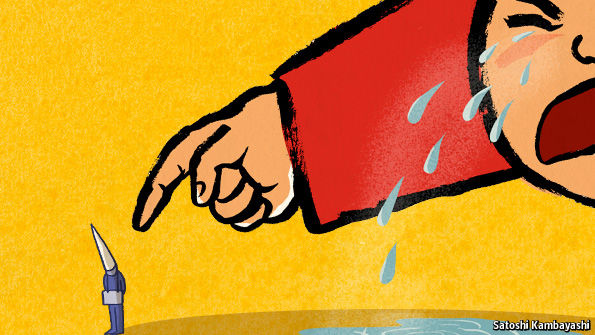A world of hurt
Poor China: so vast and so sensitive
(Feb 6th 2016 | BEIJING | From the print edition)

“I’VE hurt the feelings of the Chinese people.” So said Peter Dahlin, a Swedish citizen, in a televised “confession” after his arrest in Beijing in January. There were several disturbing aspects about the admission, including the likelihood that it was made because of pressure exerted on Mr Dahlin, who ran a Beijing-based legal-advice group (he has since been expelled). But why would the government put those particular words into his mouth?
Other countries, especially authoritarian ones, also like to express outrage about the state of their citizens’ emotions. But China is a world leader in this specialised form of righteous indignation. David Bandurski of the China Media Project at the University of Hong Kong has counted 143 instances of the phrase “hurting the feelings of the Chinese people” in the People’s Daily, the Communist Party’s mouthpiece, since 1959, when India became the first to be accused by the party of doing it—during a border dispute.
Since then, Japan has upset China most often, with 51 offences, followed by America, with 35. But you do not have to be a rival or neighbour to do it: the tiny Caribbean nation of St Lucia hurt the feelings of China’s 1.3 billion people by reopening diplomatic ties with Taiwan in 2007. How many of them had heard of St Lucia is not clear.
Albanian insults aimed at Mao Zedong in the 1970s; the defection of a tennis player to America in 1982; the accidental bombing of China’s embassy in Belgrade in 1999: all have caused emotional scarring. But three things are particularly offensive: being nice to Taiwan (28 occasions of bruised feelings); sympathy with the plight of Tibet (12); and failure to come to terms with the second world war (hence Japan’s multiple offences). Oddly, general complaints about China’s human-rights abuses are usually shrugged off—the People’s Daily has reported only two cases of hurt feelings relating to those.
The public’s supposed outrage is a useful tool: it enables the party to put aside its principle of non-interference in the internal affairs of other countries. For example, it often complains about Japanese politicians’ visits to the Yasukuni shrine in Tokyo, where war criminals are among those honoured. But the party is rarely keen on letting people express their feelings for themselves. It regards spontaneous public outbursts as a potential threat to the party’s control, loss of which would truly hurt.
From the print edition: China
























 1885
1885

 被折叠的 条评论
为什么被折叠?
被折叠的 条评论
为什么被折叠?








